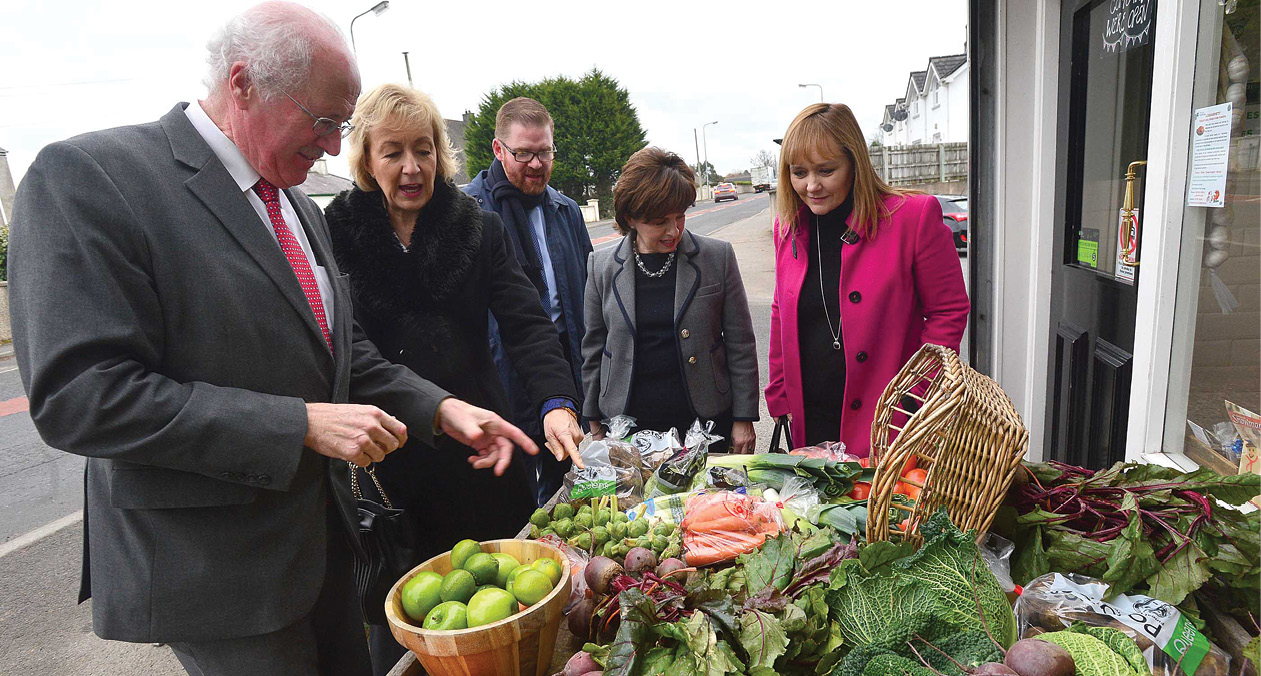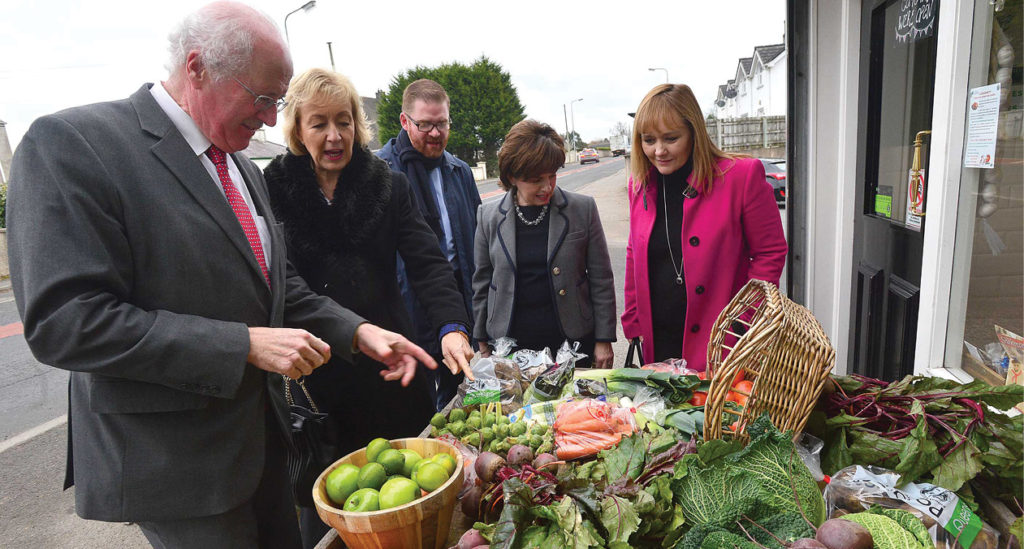Feeding optimism


 Richard Halleron analyses the challenges facing the agri-food sector in 2017.
Richard Halleron analyses the challenges facing the agri-food sector in 2017.
Last year was a topsy-turvy one for local agriculture. The spectre of volatility put great pressure on farmgate prices, particularly so within the milk sector. Ulster Farmers’ Union President Barclay Bell hopes that 2017 will be a better year financially for farmers, with a weaker sterling, one of the key trends apparent since last June’s Brexit referendum, maintaining better commodity prices.
“By any standard 2016 was a difficult year across all sectors, with poor prices hitting farm businesses hard,” he says. “This time last year few would have predicted the outcome of the EU referendum. Going forward, we as a union have a tough job on our hands. We need to ensure farmers’ interests are protected in the negotiations and that the industry is central to the development of a post-Brexit UK and local farming policy.
“Our industry also needs to develop new ways to deal with price volatility. This is not just the farmer’s responsibility. There is an onus on processors and retailers to recognise how fundamental the primary producer is to their businesses. All farmers want is a price that reflects what it costs to produce high quality food. Volatility has always been a frustration, and with EU support only guaranteed until 2020, we face a huge challenge to ensure a sustainable price for those who produce food.”
Bell believes that the envisaged introduction of a UK Agricultural Bill in 2018 may well be the road-map for the industry for the next 20 years. It is important that the younger generation of farmers feed into the debate.
“Whatever the outcome, we will all need to embrace the changes that come our way and see them as an opportunity to create a new farming policy for the UK. People sometimes ask if there will be a next generation of farmers, but I am convinced if they are part of the debate about our future we can all look forward to a reinvigorated, vibrant UK farming industry.”
Northern Ireland’s Farm Minister Michelle McIlveen also believes that agriculture can look forward with a fair degree of optimism. Speaking at the 2017 Oxford Farming Conference she said that her long-term aim is to promote a sustainable, competitive, high performing, knowledge-based agri-food sector that is prosperous and compliant, adding: “That means it will be more resilient to shocks and challenges, have high standards of animal health and welfare, deliver for the environment and have increased market access.
“Brexit represents an unprecedented and exciting opportunity for Northern Ireland. We are, undoubtedly, in unchartered waters but this provides us with significant opportunities such as the ability to develop a future agricultural policy framework better suited to local needs. One that will provide for and secure long-term sustainability; the opportunity to remove the unnecessary bureaucracy associated with current arrangements; and the option to look at a different type of agricultural policy which will provide the necessary incentives for our farmers.
“It is quite clear that we are not going to have a system like the one we currently have, but why copy a system heavy on regulations and penalties that is not working for many farmers. Leaving the EU creates the opportunity to develop something different.”
McIlveen made it clear that she will work diligently to promote and protect the needs of agriculture in Northern Ireland. She continues: “As a region, Northern Ireland will look for some type of flexibility because we are unique. Our agri-food sector is much more important to the local economy than is the case in the other parts of the United Kingdom. Future trade and support arrangements will be vital to the future prospects of our industry.”
“All farmers want is a price that reflects what it costs to produce high quality food.”
The Minister, who joined a panel discussion with political representatives from the Scottish and Welsh Governments as well as the Department for Environment, Food and Rural Affairs, told delegates that any change in support mechanisms would need to involve a period of transition but added that both she and the Stormont Executive team remain committed to getting the best deal for Northern Ireland.
“I have met with virtually every stakeholder from the agri-food, rural development, fisheries and environment sectors and have set up the joint Brexit Consultative Committee with the Economy Minister Simon Hamilton to maintain constant communication.
“The Northern Ireland Executive will play its part to ensure we get the best possible deal for the local agri-food sector, farmers, producers, processors and fishermen. I want to see a farming industry that is innovative, competitive, profitable and resilient.”
The Oxford Farming Conference also saw the UK’s Secretary of State for Environment, Food and Rural Affairs, Andrea Leadsom, calling time on the current ‘basic payment’ support system, which every farmer in Europe avails of. Whitehall strategists have said that the current scheme is guaranteed until 2020 only.
It is now thought front line support for farmers will be replaced with some form of insurance-based price or income top up measure.
County Down arable farmer Allan Chambers points out that cereal growers would need to receive a subsidy equivalent to £40 on every tonne of grain they produce, should the basic payment scheme be scrapped post-Brexit.
“That figure is based on an average grain yield of 3t/acre and the fact that the current basic payment is worth just over £120/acre,” he said. “There is talk of a crop insurance scheme of sorts being introduced, once Brexit becomes a reality. But no one is aware of how such a support measure would work. It might entail farmers putting money aside in a good year and drawing down from the fund that is created when times are tight.
“The first question to be answered is: what constitutes a good year? The other issue to be considered is whether or not a replacement for the basic payment would operate on a UK-wide basis or would Northern Ireland have the autonomy to operate a bespoke support system.”
Fundamentally, Chambers believes that local agriculture should take a “fortress Northern Ireland” approach when it comes to sorting out its farm support measures in a post-Brexit scenario.
“We know exactly how much is coming into Northern Ireland now by way of the Pillar 1 payments. So it’s simply a case of asking London to make the equivalent amount of money available, once we leave the EU, and allowing our own farm stakeholder groups to settle on support measures that best meet the needs of agriculture in Northern Ireland.”
Chambers confirmed that the recent weakening of sterling is helping to maintain local commodity prices. “I am hearing that sterling may well weaken further against the euro. If so, this will make imported produce proportionately more expensive. This will have a positive impact on the prices paid for locally produced food.”
Northern Ireland Grain Trade Association (NIGTA) Chief Executive Robin Irvine believes that the challenge of maintaining a healthy rural environment, while operating a profitable farm business, will be one of the core issues confronting local agriculture throughout 2017 and beyond.
“The recent news from Holland highlights the impact of environmental regulation on food and farming. The Dutch dairy industry is embarked on a program of measures including a reduction of their national dairy herd by 175,000 cows in an effort to bring its phosphate surplus into compliance with EU law,” he says.
“Similar pressures exist in Northern Ireland and farmers cannot afford to ignore the environmental impact of intensive agriculture. The excellent work of the Greenhouse Gas Action Plan and the recently launched Land Management Strategy point the way forward. Through a programme of precision farming and efficient use of inputs businesses can grow and develop without increasing their carbon intensity.”





